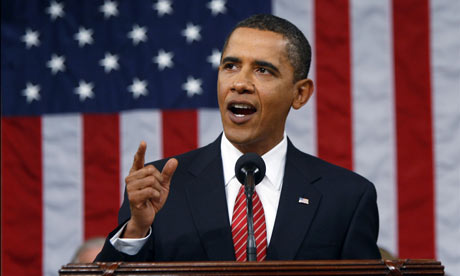American and Russian teams will start another round of talks in Vienna as early as today on a new nuclear-arms-reduction pact to replace the expiring Strategic Arms Reduction Treaty. Problem is Russia isn't meeting its obligations on some old arms-control agreements.
It's no small matter -- but the question is: Will the Obama administration make an issue of it?
Some analysts fear that, with President Obama keen for a nuke-free world, US negotiators might be willing to look the other way to reach an accord with Russia, despite a record of non-compliance with existing arms-control agreements.
So what are the Russkies scamming on?
Tactical nuclear weapons: President George Bush (41) and his Soviet/Russian counterparts, Mikhail Gorbachev and Boris Yeltsin, adopted the Presidential Nuclear Initiatives (PNI) to dramatically reduce tactical nuke arsenals.
Earlier this year, a congressional panel, the Strategic Posture Commission, reported that Russia is "no longer in compliance with its PNI commitments" --
leaving Moscow with what some say could be a 10:1 advantage in "battlefield" nukes.
Nuke testing: America, Russia and others have undertaken an informal moratorium on nuclear-weapons tests based on the 1996 Comprehensive Test Ban Treaty, which President Bill Clinton signed but the Senate never ratified.
But an SPC member warned recently that Russian "nuclear labs have been growing, their budgets have been increasing and they continue an active underground test program at Novaya Zemlya, which includes the release of low levels of nuclear energy."
This conflicts with America's no-bang, "zero-yield" standard and
suggests Moscow is doing some low-yield testing that could lead to new weapons' development. (Russian doctrine puts a premium on fighting battlefield nuclear war.)
Strategic arms: Even as it negotiates a new START treaty, the Kremlin is fudging on the existing one. A 2005 State Department report points to multiple Russian violations,
including restrictions on inspections of its intercontinental ballistic missiles and warheads.
There's more: One expert recently noted
Russia is testing its SS-27 ICBM with multiple warheads. But START identifies the SS-27 as a single-warhead missile -- and permits testing/deployment only in that configuration.
Proliferation: Others say Russia has been cutting corners on accepted non-proliferation standards -- notably, by helping Iran and North Korea develop ballistic missiles and nuclear know-how. This is no small matter, considering the threat to America.
Indeed, the director of national intelligence sent a letter to the State Department in March 2007, stating:
"We assess that individual Russian entities continue to provide assistance to Iran's ballistic-missile programs" -- which implies either Kremlin involvement in, knowledge of, or failure to intervene into these activities.
Some analysts also think North Korea got Russian help in the form of key components for its April long-range-missile test. Others see Moscow's aid to the Iranian nuclear program going beyond the reactor it's building at Bushehr.
Adding to fears Obama's negotiators won't bring up these issues in the Vienna talks is the tentative deal he struck with Russian president Dmitry Medvedev on dual-use strategic-delivery systems this summer,
drastically cutting US subs and bombers that have conventional military roles, too. They may also throw Iran-focused, Europe-based US missile defense, which the Russkies hate, under the bus in order close a deal.
Successful arms control depends on actually controlling weapons in ways that serve US national-security interests, not by merely inking new pacts for the sake of concluding a deal that sounds good.
Before we rush into signing onto any more arms-control treaties, we need to get to the bottom of Russia's non-compliance with existing arms-control and non-proliferation promises.
If we don't, the Russians will have little if any incentive to correctly implement any new treaty -- and every reason to find clever ways to cheat, as it looks like they're doing now, further jeopardizing our national security.




 Reply With Quote
Reply With Quote

 Chicago Tribune Photo, 2005
Chicago Tribune Photo, 2005

 Interactive Feature
Interactive Feature  Graphic
Graphic 








Bookmarks